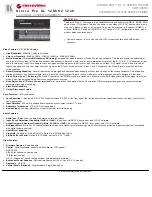
M
AKING
N
ETWORK
C
ONNECTIONS
4-8
10 Mbps Ethernet Collision Domain
Cable Labeling and Connection Records
When planning a network installation, it is essential to label the opposing
ends of cables and to record where each cable is connected. Doing so will
enable you to easily locate inter-connected devices, isolate faults and
change your topology without need for unnecessary time consumption.
To best manage the physical implementations of your network, follow
these guidelines:
•
Clearly label the opposing ends of each cable.
•
Using your building’s floor plans, draw a map of the location of all
network-connected equipment. For each piece of equipment, identify
the devices to which it is connected.
•
Note the length of each cable and the maximum cable length
supported by the switch ports.
•
For ease of understanding, use a location-based key when assigning
prefixes to your cable labeling.
•
Use sequential numbers for cables that originate from the same
equipment.
•
Differentiate between racks by naming accordingly.
•
Label each separate piece of equipment.
•
Display a copy of your equipment map, including keys to all
abbreviations at each equipment rack.
Table 4-6 Maximum Ethernet Cable Length
Cable Type
Maximum Cable
Length
Connector
Twisted Pair, Category 3 or better
100-ohm UTP
100 m (328 ft)
RJ-45
Summary of Contents for 6128L2
Page 2: ......
Page 14: ...COMPLIANCES x ...
Page 18: ...TABLE OF CONTENTS xiv ...
Page 20: ...xvi ...
Page 22: ...FIGURES xviii ...
Page 30: ...ABOUT THE TIGERSWITCH 1 8 ...
Page 46: ...INSTALLING THE SWITCH 3 10 ...
Page 68: ...ORDERING INFORMATION D 2 ...
Page 78: ...Glossary 6 ...
Page 82: ...INDEX Index 4 ...
Page 83: ......
















































